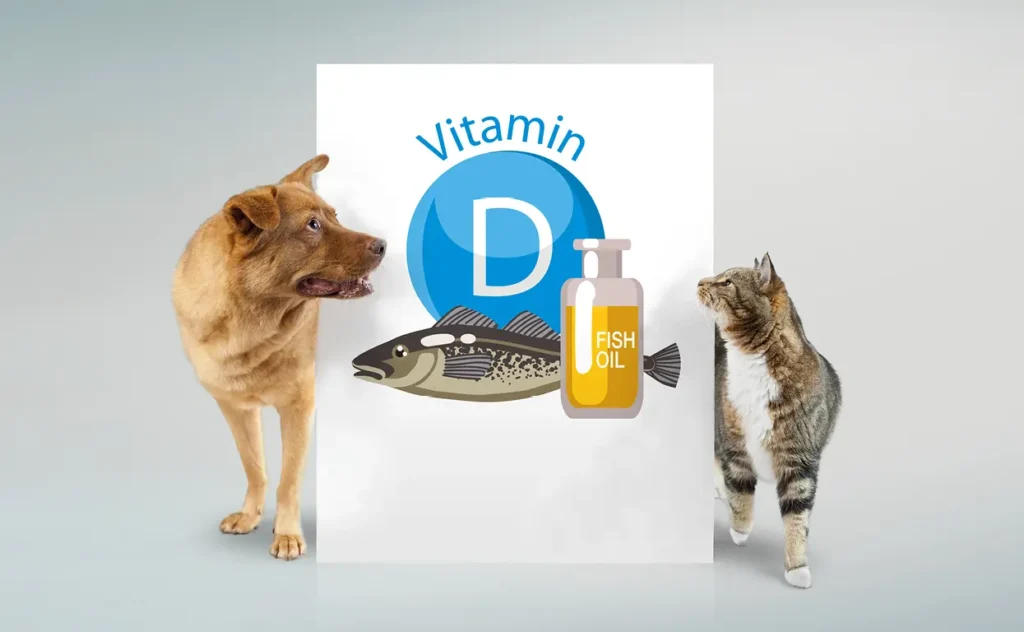Should I buy fish oil for my pet? Does fish oil for pets have side effects? In this article, Dr. Wen shares the benefits of fish oil for dogs and cats, which pets are recommended to eat fish oil, and which pets are not suitable for it, and finally introduces the principles of choosing fish oil for cats and dogs!

1. Why should pets take fish oil? 4 benefits of eating pet fish oil for cats and dogs
You may have seen your friends and relatives around you have the habit of regularly supplementing fish oil, but did you know that there is also a “pet fish oil” exclusive for fur babies? What are the benefits of fish oil for pets? How to choose? Before mastering this information, let veterinarian Wen Congfei briefly introduce to you what pet fish oil is!
(1) Why do dogs and cats need fish oil?
Fish oil is rich in Omega-3 fatty acids, which can help build cell membranes and provide energy for body operations. However, Omega-3 is a type of “essential fatty acid”, which means that cats and dogs cannot synthesize this nutrient on their own and can only supplement it through diet, such as salmon and fish oil health products.
Omega-3 can be roughly divided into three forms, namely EPA and DHA from animal sources, and ALA (alpha-linolenic acid) from plant sources. However, cats and dogs are not the same as humans. They absorb ALA less efficiently. Therefore, cats and dogs are more suitable to supplement animal sources of EPA and DHA than supplementing ALA from plant sources.
However, some owners may worry whether their pets will be too oily if they eat fish oil. In fact, fish oil is a good type of oil and is also a nutrition often recommended by veterinarians. However, too much nutrition is not good for your health. You can refer to the daily intake amount on the package or consult a professional veterinarian for advice.
(2) What are the benefits of using fish oil for pets? Which pets are suitable for taking fish oil?
The Omega-3 in pet fish oil is a very good nutrient for pets. If you are a loving pet owner and want to quickly understand the effects of pet fish oil and which furry children it is suitable for, don’t miss the following dogs and cats Introduction to the benefits of fish oil for cats.

Benefits of fish oil for cats and dogs 1: Helps control inflammation
A research analysis by the American Veterinary Medical Association (AVMA) found that the Omega-3 fatty acids in fish oil help control inflammation, and EPA and DHA can help cell signaling. Therefore, pet fish oil is often used in the diet to help maintain good health, including:
Maintain joint health: Suitable for dogs and cats with joint inflammation and joint problems.
Protect skin: maintain good skin condition, suitable for cats and dogs with sensitive skin.
Cardiovascular health: Keeping the cardiovascular system healthy can also help with loss of appetite caused by cardiovascular disease.
If pet owners can appropriately supplement their pet’s diet with pet fish oil rich in Omega-3, they can help maintain the health of their furry children. However, detailed feeding amounts must still be consulted by a professional veterinarian.
Benefit 2 of fish oil for cats and dogs: Helps skin health and maintains shiny hair
The fluffy fur of your pet always makes people can’t help but touch it again and again. In addition to the feel and appearance, the pet’s hair can also regulate body temperature, block ultraviolet rays, block moisture, etc.; and the skin of pets is even more important on their bodies. The largest organ, they help protect the body from pathogens, regulate temperature, and prevent dehydration, among other functions.
Protein, vitamins, and essential fatty acids are all the keys to making pet fur bright and shiny. Moderate supplementation of Omega-3 fatty acids for cats and dogs can help furry pets maintain healthy skin and shiny hair from the inside out.
Benefits 3 of fish oil for cats and dogs: Suitable for all ages! Maintain brain and eye health
The DHA in fish oil is an important component in maintaining the functioning of the brain and eyes. DHA can help kittens perform better in memory, hearing, vision and brain development. As for dogs, a 2007 study by Dr. John E. Bauer showed that if puppies are supplemented with food containing DHA, it can help the development of the nervous system.
In addition, the same study also mentioned that fish oil can help the cognitive learning ability of mature and elderly cats. The experiment provided cats with fish oil, vitamin B, arginine, and antioxidant nutrients. The results showed that cats performed very well in tests such as learning, cognition, and memory. Mature and old dogs also get good results in terms of agility and memory when taking fish oil.
Benefits 4 of fish oil for cats and dogs: taking care of kidney health
Kidney health is the health gate for many cats, and a 2022 Journal of Feline Medicine And Surgery study pointed out that providing fish oil to cats suffering from polycystic kidney disease can help control various indicators. This shows that fish oil can help cats Kidney care for children.
2. FAQ about fish oil for pets! Let me tell you the side effects of cat fish oil and dog fish oil at once!
“How to feed fish oil to pets?” has always been a doubt in the minds of many pet owners. How to determine the dosage of fish oil for dogs and cats? Are there any side effects if cats take fish oil or if dogs take fish oil? Can I give my fish oil to my fur baby? The following will give you a quick introduction!

Q. What is the dosage of fish oil for cats and fish oil for dogs?
According to AAFCO (Association of American Feed Control Official), it is recommended that dogs’ diet should be supplemented with at least 100 mg of EPA and DHA per 1,000 calories to help the dog’s nutritional needs for growth; while for cats, it is recommended 30 mg of EPA and DHA is optimal. The maximum dose of fish oil for adult dogs and cats has not yet been determined.
Although fish oil for pets seems to have many benefits, owners need to consider the breed, size, weight and overall health of their pets before feeding fish oil to cats or dogs. It is best to discuss and evaluate with a professional veterinarian before deciding on the daily dosage. Fish oil dosage is the best policy.
Q. Are there any side effects of fish oil for pets?
It is generally believed that fish oil is safe for pets, but it may still cause side effects to pets, including diarrhea, vomiting, lethargy, weight changes, and effects on coagulation function. Excessive consumption may also lead to overnutrition, or make the skin and mouth of your furry child emit a fishy smell.
Therefore, be sure to discuss it with your veterinarian before providing any nutritional supplements to your furry child to avoid affecting your furry child’s health.
Q. Can pets eat human fish oil?
Some fish oils for humans may contain added sweeteners, artificial flavors or other chemical ingredients, which may not be suitable for your pet. In addition, even if it is determined that the product is pure fish oil, the dosage of fish oil for human consumption may be too much for pets, which is also a major concern. Therefore, it is recommended that pet owners bring the product to discuss with a professional veterinarian to confirm whether the purchased product is suitable for them. Furry kid.
Q. Which furry children are not suitable for taking fish oil?
Although fish oil has many benefits, not every furry child is suitable for taking fish oil. Here are three groups that are not suitable for taking fish oil for pets:
Pets allergic to fish oil
Pets taking anticoagulant medications
Pets with coagulation disorders
“In addition to the above-mentioned groups, pets that are pregnant, suffer from diabetes, have a history of pancreatitis, and take non-steroidal anti-inflammatory drugs are also high-risk groups for consuming fish oil. Please be sure to consult a professional veterinarian before feeding.”
Q. How to feed fish oil to pets?
Common forms of pet fish oil include feeding capsules directly, or adding fish oil liquid to food (for example, wet food is suitable for mixing fish oil). Some people also cut the capsules and drip fish oil into the food.
Fish oil feeding is not restricted and must be done on an empty stomach. If your pet experiences gastrointestinal discomfort after eating fish oil on an empty stomach, it is recommended that the fish oil be mixed into the diet.
3. How to choose fish oil for pets? Pay attention to the following 4 points when choosing fish oil for pets

There are many recommended products for cat fish oil and dog fish oil. How should you choose to avoid making the wrong purchase? Don’t worry, don’t worry, we have heard all the questions from all the owners! Below, veterinarian Wen Congfei provides 4 details to pay attention to when choosing pet fish oil to help everyone find the most ideal pet fish oil.
Recommended principles for pet fish oil 1. Check the ingredients & sources of fish oil
The most important thing when buying fish oil is to check the ingredients. It is recommended that you carefully observe whether the product contains EPA and DHA to ensure that your pet is getting important Omega-3.
“In addition to the ingredients, you should also pay attention to the source of your pet’s fish oil and avoid choosing fish oil products from unknown sources to prevent unscrupulous manufacturers from improperly handling the fish oil and increasing the risk of heavy metal poisoning.”
Recommended principles for pet fish oil 2. Pay attention to the storage method of fish oil
Since the EPA and DHA in fish oil are prone to oxidation and deterioration, in addition to the unpleasant fishy smell, they cannot be eaten by pets anymore, so the storage method is very important. Fish oil can be stored in a cool, dry place away from direct sunlight. Some pet fish oil products need to be refrigerated. Before purchasing, you can learn how to store the product to ensure that the fish oil can stay fresh.
Recommended principles for pet fish oil 3. Choose the type of fish oil according to your eating habits
There are two common types of fish oil on the market, namely capsules and liquid packaging. Owners can observe the different eating habits of each furry child and choose the appropriate fish oil type.
“If your furry kids don’t like to swallow capsules, you can add a few drops of liquid fish oil to their diet. If dogs and cats are picky and don’t like the fishy smell of fish oil, then fish oil capsules are a good choice.”
Recommended principles for pet fish oil 4. Compare pet fish oil types
Commercially available fish oil is roughly divided into three types: TG type, EE type, and rTG type. Parents can choose the appropriate type according to their own needs:
TG type (Triglyceride Form): It is the most natural form of fish oil. It has the same ingredients as cats and dogs that eat fish directly. However, generally commercially available TG type fish oil contains a lower ratio of EPA and DHA.
EE type (Ethyl Ester form): This type of fish oil has undergone more processing and contains significantly higher concentrations of EPA and DHA. However, the absorption effect is not as good as that of TG type.
rTG type (re-esterified triglyceride type): rTG type fish oil uses newer extraction technology to increase the concentration of EPA and DHA, and removes glycerin from the fish oil, allowing nutrients to be directly absorbed by pets, increasing absorption efficiency, but the price Also the most expensive.
